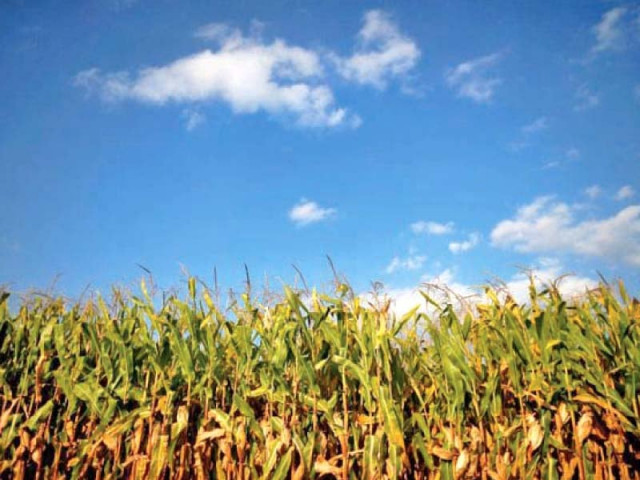In Pakistan, banks urged to increase agri-credit disbursement
SBP governor says farm credit crossed Rs1tr for first time in history in FY19

Overall agriculture credit disbursement target of Rs1,350 billion has been assigned to banks for FY20, which is 89% of the total estimated credit requirement of Rs1,518 billion. PHOTO: FILE
“It is for the first time in Pakistan’s history that credit to the agriculture sector has surpassed Rs1 trillion,” said the governor in his keynote address.
He was chairing the annual meeting of the Agricultural Credit Advisory Committee (ACAC) held in Peshawar as part of efforts to enhance agriculture credit in the underserved provinces and regions.
Baqir, however, urged the banks to meet qualitative aspects of the assigned targets as well in line with the strategic shift and key policy actions taken by the SBP for agricultural financing.
Govt launches Rs309.7b agricultural programme
He highlighted that most of the banks met their assigned targets except for some including Zarai Taraqiati Bank Limited (ZTBL), Punjab Provincial Cooperative Bank Limited (PPCBL), some domestic private banks and Islamic banks, which fell short of the targets.
Province-wise agriculture credit disbursement showed a double-digit growth across all provinces and regions but banks struggled to achieve the targets in underserved regions. He urged the banks and institutions to step up efforts and commitment to ensure the achievement of agriculture credit targets in the underserved provinces and regions. The central bank governor pointed out that the SBP was considering three policy actions to further promote financial inclusion in the agriculture sector.
First, it wants to enhance transparency through disclosure of bank-wise performance statistics on a monthly basis covering agriculture credit disbursement, geographical distribution, outstanding amount, number of borrowers and agriculture credit infrastructure. Second, it seeks to introduce a comprehensive scoring model for the ranking of banks based on key agriculture credit indicators and targets. Third, it will introduce incentives and penalties based on the performance scores of banks.
Baqir emphasised that there were huge lending opportunities for banks, which would promote financial inclusion and aid their profitability.
The governor’s speech was followed by a presentation where the performance of banks in agriculture financing in FY19 was reviewed.
It was shared that the overall agriculture credit disbursement target of Rs1,350 billion had been assigned to banks for FY20, which was 89% of the total estimated credit requirement of Rs1,518 billion.
It was highlighted that Islamic banks and Islamic branches of commercial banks had been assigned the disbursement target of Rs110 billion for FY20, which was in line with the previous year to help realise the potential of Islamic agriculture financing.
Furthermore, the overall target of outstanding borrowers was enhanced to 4.67 million with the addition of 650,000 new borrowers.
The committee deliberated on the new directions in agriculture financing by focusing on technology, especially the digitalisation of agriculture loan processes through the adoption of Land Record Information Systems, Electronic Warehouse Receipt Financing System and initiatives like the Kissan Digital Portal. These were key priorities under the National Financial Inclusion Strategy 2023.
Agriculture has potential to give boost to economy
Subsequently, presentations were made on the dairy value chain in Gilgit-Baltistan by the Bank of Khyber, olive plantation and its value chain development by the Pakistan Agricultural Research Council, the innovative project to reclaim barren land by a progressive farmer, rural lending through digitisation by HBL, agriculture credit through alternative delivery channels by Khushhali Bank and opportunities for co-financing of Public Sector Development Programme (PSDP) projects through banks by the Ministry of National Food Security.
Concluding the meeting, the central bank governor encouraged all stakeholders to collaborate in order to enhance the flow of formal credit to the agriculture sector.
He expressed optimism that banks would explore new investment opportunities through collaboration and experience sharing to achieve the annual target for FY20 besides achieving their regional targets, particularly in the underserved areas.
Senior officials of federal and provincial governments, presidents/CEOs of banks, members of provincial chambers of agriculture, progressive farmers, representatives of Khyber-Pakhtunkhwa farming community and SBP officials attending the meeting.
Published in The Express Tribune, November 20th, 2019.
Like Business on Facebook, follow @TribuneBiz on Twitter to stay informed and join in the conversation.


















COMMENTS
Comments are moderated and generally will be posted if they are on-topic and not abusive.
For more information, please see our Comments FAQ